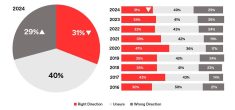Farm Credit Canada’s top economist says if you’re a Canadian farmer, you should really be hoping for the best in the Chinese economy.
That’s because while population growth catches all the headlines and is credited for growing food demand, it’s looking increasingly like we’ll be able to feed nine billion by 2050. The question is how well.
Jean-Phillippe Gervais told the recent Manitoba Special Crops Symposium that there might be some resource constraints that humanity will have to carefully manage around — water resources for example — but that he’s convinced starvation doesn’t await us.
Read Also

Mazergroup’s Bob Mazer dies
Mazergroup’s Bob Mazer, who helped grow his family’s company into a string of farm equipment dealerships and the main dealer for New Holland machinery in Saskatchewan and Manitoba, died July 6 from cancer.
But he encouraged farmers to consider where the growth is coming from. He noted that population growth is strongest where people are poorest, meaning they’re not customers for anything but the most basic foodstuffs. If commodity prices are going to remain strong, they’ll be driven by better economic conditions and growing demand for better food, including meat, Gervais said.
“So you have to ask, ‘Where’s that growth going to come from, to fuel that demand?’ I would argue that the important growth isn’t population growth, but income growth.”
Gervais said much of the First World continues to have dark clouds hovering over the economy, and the U.S. “fiscal cliff” crisis has only been deferred, not resolved.
“If the U.S. winds up in recession, you can expect that slowdown to affect the rest of the world,” he said.
The European Union isn’t out of the woods yet either, he said.
“Half of the young people are being adversely affected,” Gervais said. “In Europe, in the 18-24 age group, there is 50 per cent unemployment.”
Gervais said he expects 2013 to feature more of the same for the EU as it continues to try to muddle through the mess balancing economic and political realities.
Here at home the picture isn’t particularly bright either. Gervais pointed out that Canadian households have a now well-publicized problem with debt levels, one that’s attracted the attention of international credit rating agencies.
“Moody’s just downgraded five out of six credit ratings of the major Canadian banks,” Gervais said, adding that regardless what the Bank of Canada does with its benchmark rate, banks are going to pay higher prices to attract funds.
“We’re not talking about significant rises — maybe 10 basis points (one-tenth of a per cent) or so,” he said. “The point is that it’s going to hurt the financial sector and impact interest rates.”
Canadian cash hoard
Essentially the story is the same throughout the developed world — governments and consumers alike are increasingly tapped out.
“This is really putting the onus on business to spend,” Gervais said. “In Canada that’s probably not a bad thing. We have a productivity issue, and businesses need to invest. They’re also sitting on a record amount of cash.”
Gervais said Canadian businesses are sitting on a cash hoard equal to 30 per cent of the entire Canadian economy, though the reason isn’t a happy story either. “They just don’t see the growth opportunities out there.”
However, the picture brightens when focus shifts to the developing economies such as India and China, Gervais said. Even there it’s just less ugly, with China notching the lowest economic growth numbers in 2012 than it’s seen in the last dozen years, at 7.4 per cent.
“Early economic indicators suggest that they bottomed out last year,” Gervais said. “Current growth is at 7.9 per cent and the expectation is they’d be around 8.1 or 8.2 per cent by the end of the year, which is likely a sustainable pace.”
This is important to Canadian farms because a vigorously growing Chinese economy means a growing middle class with an appetite for imports, Gervais said.
The picture isn’t quite so bright in India. Just a few years ago it was touted to be the other developing world juggernaut, but that’s never really panned out.
“India was going to be the next big thing,” Gervais said. “But they have systemic problems with things like corruption they’ve yet to overcome.”
Even so, India is still posting growth numbers that would be the envy of the developed world.
“There, the current pace is 5.3 per cent, and they could be in the range of six per cent for 2013,” Gervais said. “That’s positive for income growth.”
During the question-and-answer period following his talk, Gervais conceded that questions even remain over the fast-growing economies, mainly whether their growth was going to be sustainable in light of weak economic growth in the economies that had traditionally been their customer base.
“It is true that the Chinese economy has depended heavily on exports,” he said. “If you look at the consumer spending in their economy, it’s only about 30 per cent. In Canada it’s 65, in the U.S. it’s 70 per cent. They also have a huge savings rate — about a third of income, compared to only about two per cent in Canada.”
He also said there were quiet ongoing concerns about the reliability of Chinese data.
“They seem to be very efficient at generating their data,” he said. “When everyone else is still working on Q3 (third quarter), they’ll already have released Q4.”



















